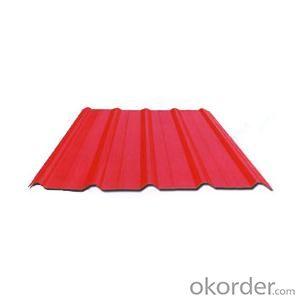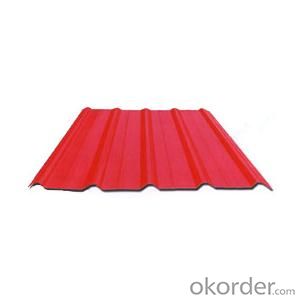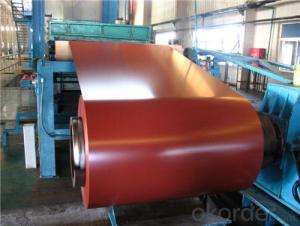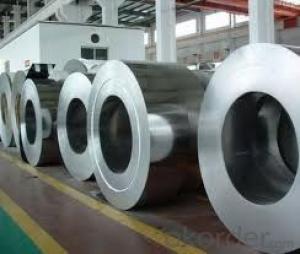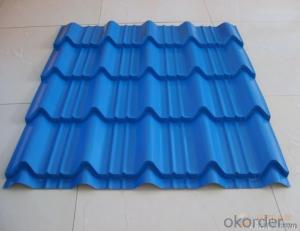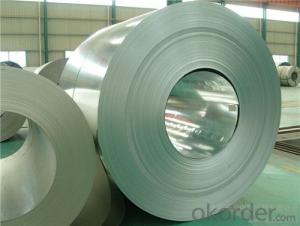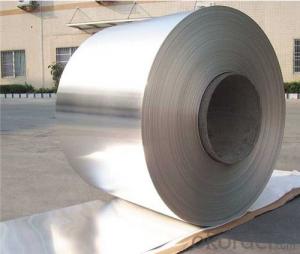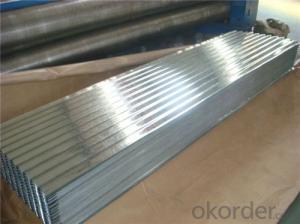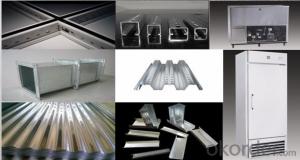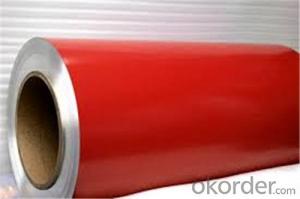Pre-Painted Galvanized/Aluzinc Steel Roof with Good Price
- Loading Port:
- Tianjin
- Payment Terms:
- TT OR LC
- Min Order Qty:
- 50 m.t.
- Supply Capability:
- 10000 m.t./month
OKorder Service Pledge
OKorder Financial Service
You Might Also Like
1. Pre-Painted Galvanized/Aluzinc Steel Roof Description:
With GI as base material, after pretreatment (degrease and chemical treatment ) and liquid dope with several layers of color, then after firing and cooling, finally the plate steel is called pre-painted galvanized (aluzinc) steel. Pre-painted galvanized roof is good capable of decoration, molding, corrosion resistance. It generally displays superior workability, durability and weather resistance.
2.Main Features of the Pre-Painted Galvanized/Aluzinc Steel Roof:
• Excellent process capability
• Smooth and flat surface
• Workability, durability
• Excellent heat resistance performance
• High strength
• Good formability
• Good visual effect
3.Pre-Painted Galvanized/Aluzinc Steel Roof Images
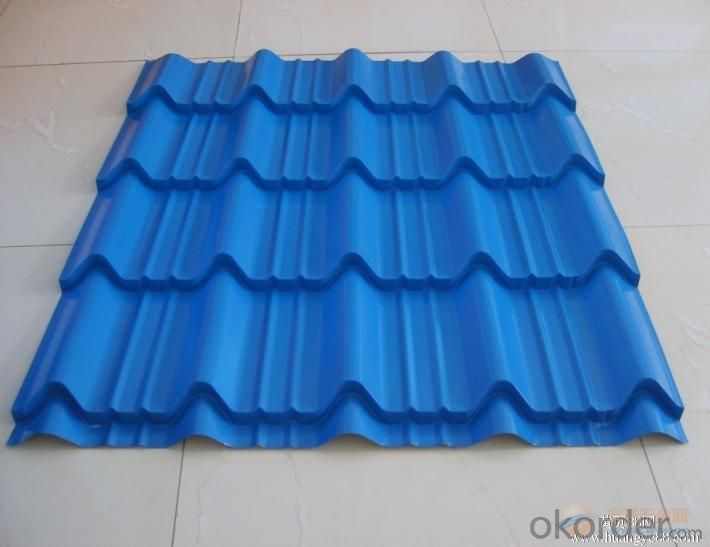
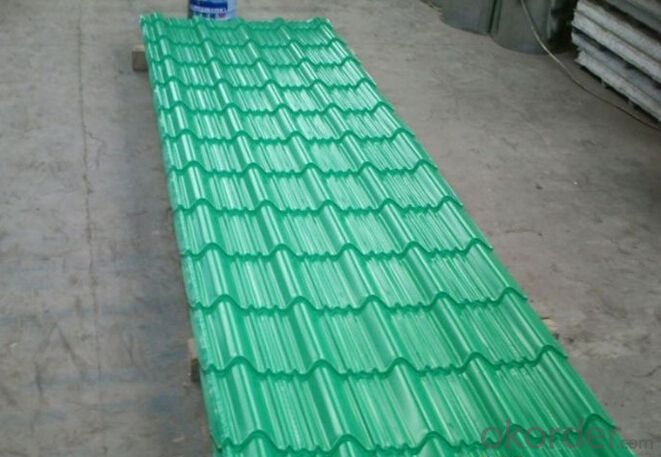
4.Pre-Painted Galvanized/Aluzinc Steel Roof Specification
Standard: AISI, ASTM, BS, DIN, GB, JIS
Grade: SGCC SGCH SGCD DX51D
Thickness: 0.13-3.0mm
Model Number: AISI, ASTM, BS, DIN, GB, JIS
Type: Steel Plate
Technique: Cold Rolled
Surface Treatment: Galvanized
Application: Container Plate
Special Use: High-strength Steel Plate
Width: 30-1500mm
Length: any length
color: RAL color
5.FAQ of Pre-Painted Galvanized/Aluzinc Steel Roof
What’s the brand of the paint?
We use the best brand of all of the word—AKZO.
What’s the wet and heat resistance of the roof?
More than 1000 hours.
- Q: Are Danielle steel books good to read. Im 15 , but do I have to wait until Im a bit older.
- Wait until you are eighty, the dementia will make the process less painful Otherwise, you know best how mature you are and Danielle Steel is sugary romance, not really sex.
- Q: On a free standing carport with an 8 inch, 22 foot long aluminum i-beam, would a steel 8-inch i-beam be just as strong? I am looking into it since they are cheaper.
- Yes-- just make sure that your connection to the beam is secure. Since you call it an I beam -- I assume that it is steel. Don't do any drilling -- use two heavy duty c-clamps to hang your bar from.
- Q: Please give me the name of the steel, and the percentage of materials from what It consists, if you can give me five types of steel it will be better so I can decide. Thanks.
- Without okorder .. Plus few other useful resources. In the end, there's no one best steel, not even 5. It all depends on the knife design, use, edge thickness, what you cut, etc...
- Q: it isn't a SIGG water bottle or any other brand, as it's from thingsengraved what I'm wondering is, is this just as good as a SIGG water bottle, or is there any difference?
- The problem with stainless steel water bottles is the steel takes even longer to decompose in our landfills then plastic its self. So it just adds to the waste. If you use steel be sure to recycle it when you are done using it. Another problem is the fact that we don't really make steel here anymore so you have to pollute the environment shipping steel here that the bottles are made from. It gets ship here on trucks, ships, and what not. Very big polluters!! You'd be better off just getting a reuseable bpa free plastic water bottle made in the usa. Or some of those expensive corn cups.
- Q: How do steel coils contribute to strength and stability in structures?
- Steel coils contribute to strength and stability in structures due to their inherent properties. The coils are made of high-strength steel, which provides excellent tensile strength and resistance to deformation. When used in structural components such as beams, columns, or foundation systems, steel coils reinforce the structure and help distribute loads evenly, enhancing its overall strength and stability. The flexibility and durability of steel coils also enable structures to withstand external forces, such as wind or seismic loads, without significant deformation or failure.
- Q: What are the dimensions of steel coils used in the pipeline industry?
- The dimensions of steel coils used in the pipeline industry can vary depending on the specific application and requirements. However, common dimensions for steel coils used in the pipeline industry typically range from 0.5 to 3.0 inches in thickness and 24 to 60 inches in width. The length of the coils can vary as well, with standard lengths often ranging from 100 to 200 feet. These dimensions are designed to meet the necessary strength and durability requirements for pipeline construction and transportation of various fluids and gases. It is important to note that these dimensions can vary depending on the specific project and industry standards.
- Q: How are steel coils protected from corrosion?
- Steel coils are typically protected from corrosion through a process called galvanization, where a layer of zinc is applied to the surface of the steel. This zinc coating acts as a sacrificial barrier, preventing the steel from coming into direct contact with moisture and oxygen, which are the primary causes of corrosion. Additionally, steel coils can also be protected through the application of protective coatings or by storing them in a controlled environment to minimize exposure to corrosive elements.
- Q: What are the different grades of steel used in coil production?
- There are several grades of steel used in coil production, including low carbon steel, high carbon steel, stainless steel, and galvanized steel. Each grade has its own unique properties and is chosen based on the specific requirements of the coil application.
- Q: Can steel coils be used in the automotive industry?
- Steel coils find extensive use in the automotive industry. They are frequently employed in the production of diverse automotive components and parts. Specifically, they are well-suited for applications necessitating robustness and longevity, such as body panels, chassis components, suspension parts, and engine components. Steel coils exhibit remarkable structural integrity, corrosion resistance, and impact resistance, all of which are indispensable attributes for automotive purposes. Besides, they can be effortlessly molded and shaped into desired dimensions, rendering them exceptionally adaptable and cost-effective for automotive manufacturers. In summary, due to their outstanding mechanical properties and adaptability for diverse automotive applications, steel coils enjoy widespread utilization in the automotive industry.
- Q: What are the factors that affect the quality of steel coils?
- There are several factors that can affect the quality of steel coils. Firstly, the composition of the steel itself plays a crucial role in determining its quality. The presence of impurities, such as sulfur or phosphorus, can adversely affect the strength, durability, and overall performance of the steel. Additionally, the carbon content, alloying elements, and heat treatment of the steel also contribute to its quality. Secondly, the manufacturing process and techniques used during the production of the steel coils can significantly impact their quality. Factors such as the cleanliness of the production environment, the precision of the rolling and cooling processes, and the control of temperature and pressure during manufacturing can all influence the final quality of the coils. Furthermore, the surface quality of the steel coils is also a crucial factor. Any defects or imperfections on the surface, such as scratches, dents, or corrosion, can compromise the integrity and functionality of the coils. Proper handling, storage, and transportation of the coils are essential to maintaining their surface quality. Moreover, the mechanical properties of the steel coils, including tensile strength, yield strength, and elongation, are essential indicators of their quality. These properties depend on various factors, such as the type of steel, its thickness, and the processing conditions. Lastly, external factors such as environmental conditions, such as humidity and temperature, can affect the quality of steel coils. Exposure to moisture or extreme temperatures can lead to corrosion or other forms of degradation, impacting the overall quality and longevity of the coils. In conclusion, the quality of steel coils is influenced by several factors, including the composition of the steel, the manufacturing process, surface quality, mechanical properties, and external environmental conditions. It is crucial to ensure that these factors are carefully controlled and monitored to produce high-quality steel coils that meet the desired specifications and standards.
Send your message to us
Pre-Painted Galvanized/Aluzinc Steel Roof with Good Price
- Loading Port:
- Tianjin
- Payment Terms:
- TT OR LC
- Min Order Qty:
- 50 m.t.
- Supply Capability:
- 10000 m.t./month
OKorder Service Pledge
OKorder Financial Service
Similar products
Hot products
Hot Searches
Related keywords
